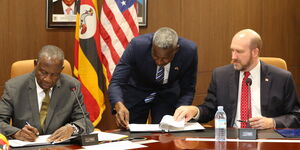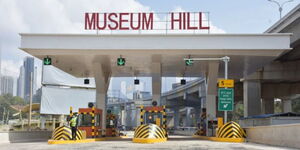President William Ruto’s nominee for Inspector General of Police, Douglas Kanja Kirocho, has pledged to bring sweeping changes to the National Police Service, starting with the introduction of body-worn cameras, particularly for traffic officers.
This commitment, announced during his appearance before the National Assembly Committee on Administration and Internal Security, as well as the Senate Standing Committee on National Security, Defence and Foreign Relations, is seen as a significant step toward enhancing accountability within the force.
Kanja’s promise comes amid a growing public outcry over corruption within the traffic police department. Motorists frequently report harassment and demands for bribes, despite regular arrests, demotions, and prosecutions of officers caught engaging in such activities.
The Ethics and Anti-Corruption Commission (EACC) has flagged corruption in traffic management as a major contributor to road safety violations, which often result in fatal accidents.
The introduction of body cameras could mark a turning point in the fight against corruption in Kenya's police force.
These devices, which provide an unbiased record of police-civilian interactions, are seen as crucial tools for ensuring transparency. By capturing every interaction, body cams could deter officers from engaging in corrupt practices and offer a clear record in cases of misconduct.
Kanja, who previously served as the Deputy Inspector General in charge of the Kenya Police Service and as the commandant of the General Service Unit, emphasised his commitment to eradicating conflicts of interest within the force.
He pointed out that some officers own businesses such as bars, wines, and spirits shops, or even operate matatus (public minibuses), creating situations where personal interests could compromise their professional duties.
“This is an issue I tackled head-on when I was the Deputy Inspector General,” Kanja asserted. “It’s crucial that officers make a choice—either serve the public without any conflict of interest or step aside.”
The Ethics and Anti-Corruption Commission's spokesperson, Eric Ngumbi, recently highlighted the systemic corruption within traffic management, where roadblocks often function as toll stations for bribes.
Officers, according to Ngumbi, are pressured to meet daily targets for bribe collection, with the proceeds being shared up the ranks. This culture of corruption not only undermines road safety but also fosters impunity among motorists, leading to accidents that could have been prevented.
Ngumbi last year warned that the impunity resulting from bribery often leads to the loss of lives and injuries through avoidable road accidents. “Drivers who have paid off officers no longer feel the need to comply with road safety measures because they know there won’t be any consequences,” he noted.
Kanja's proposal to introduce body cams is part of a broader effort to restore public trust in the police force. Alongside the cameras, he has called for officers to display name tags and service numbers, ensuring that they can be held accountable for their actions.
This follows a recent court ruling that banned police from wearing plainclothes, masks, and using unmarked cars during protests—a move aimed at increasing transparency and protecting citizens' rights.












